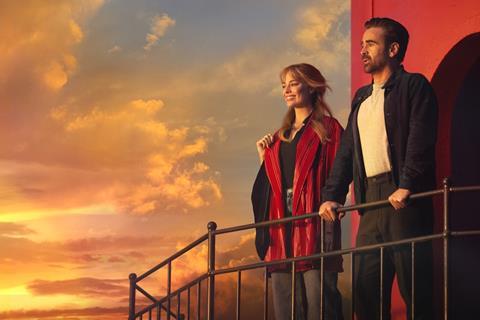
Dir: Kogonada. US. 2025. 108mins
Two lost and lonely souls find a fantastical connection in the third feature from Korean-American filmmaker Kogonada (Columbus, After Yang), which strives to be a soaring, life-affirming romantic drama but ends up struggling under the weight of its own laboured whimsy. Margot Robbie and Colin Farrell certainly make for a handsome pairing – and undoubtedly have serious chemistry – as two singletons thrown together for a road trip which takes them to key moments from their pasts, but this high-concept feature tries so hard to charm that it becomes an exercise in wading through sickly sweet treacle.
Plays like a beginner’s guide to pop psychology
A Big Bold Beautiful Journey is clearly aiming for the sweeping, surrealist universality of Everything Everywhere All At Once, and also has a great deal in common with recent Stephen King adaptation The Life Of Chuck, but lacks any real humour, emotional shading or moments of dramatic levity. Nevertheless, Robbie and Farrell should prove a strong selling point when the film rolls out globally from September 17 (it hits US and UK cinemas on September 19), and it will likely find an appreciative audience more than willing to be swept away by its traditional Hollywood styling and unabashed escapism.
When we meet David (Farrell) in an unnamed US city, he is preparing to travel to a friends’ wedding alone; his usual modus operandi. A clunky phone conversation with his parents in Ireland establishes David is something of a loner; “be more open,” is the helpful advice from his dad. His car having been clamped, David is forced to turn to the local Car Hire Agency – a cavernous warehouse space manned by Phoebe Waller-Bridge (sporting a bizarre German accent and seemingly ripped straight from Wes Anderson central casting) and a subdued Kevin Klein, who treat David as if he’s there for some kind of audition. “Sometimes we have to perform to get to the truth,” intones Waller-Bridge, reverting for a moment to her normal British accent; not so much a narrative signpost but a huge neon billboard.
This lack of subtlety will plague the rest of the film, which plays like a beginner’s guide to pop psychology and has none of the light touch of Kogonada’s Columbus or the specificity of his follow-up After Yang (also starring Farrell), both of which were similarly concerned with notions of identity and human attachment. It also lacks the knowing bite or sharp wit of screenwriter Seth Reiss’s previous film The Menu, instead leaning wholeheartedly into schmaltzy melodrama.
Finally making it to the wedding – which takes place in the pouring rain, weather being a blatant metaphor throughout – David meets Sarah (Robbie), who immediately reveals herself to a standard manic pixie dream girl, speaking about her unending capacity to hurt men in one moment and impulsively proposing in the next. David, for his part, stays locked up tight, refusing even to dance with Sarah despite their clear attraction.
The following day, events conspire to bring them together on a bizarre road trip directed by the car’s silky, insistent GPS (voiced by Jodie Turner-Smith). In random locations they encounter various doors from their past – David’s high school, Sarah’s favourite museum, the hospital in which her mother died – through which they walk without question or hesitation. Here, they get the chance to relive (and re-process) the moments which made them, ranging from David getting his heart broken at age 15 to Sarah confronting the guilt she feels for not being at her mother’s bedside during her final hours.
It’s certainly a big, bold idea, and has moments of visual beauty – Katie Byron’s vibrant production design and Arjun Bhasin’s primary-colour costuming (dark blues for David, reds and yellows for Sarah) popping off the screen in a way that recalls La La Land, another film in which a glossy shell hides a more shadowy reality. But here it is all so very obvious, the screenplay joining the dots between David and Sarah’s past traumas and their current issues in a straight line that is anything but revelatory. John Hishaishi’s score also behaves exactly as you would expect, by turns mournful and optimistic, while song choices – including Pete Townshend’s ’Let My Love Open The Door’ – are roundly on the nose.
There are some poignant scenes in which David and Sarah have a rare opportunity to return to their family home and really understand their parents as adults, but these feel like slight detours in a journey that is so clearly leading in one direction – happy ever after – rather than moments of genuine insight or reflection. Other sequences, including a diner showdown with ex-lovers, feel like sitting in on an awkward therapy session.
The film occasionally cuts from its various locales to David and Sarah acting out these scenarios on a stark soundstage, further hammering the point that all the world’s a stage, and men and women merely players. “Now it’s getting too dramatic” observes Sarah at one point, without any trace of irony. And that’s essentially the crux of the problem. Ultimately, A Big Bold Beautiful Journey is so carefully contrived, so happy to revel in its artifice, that it doesn’t give the viewer the opportunity to make any genuine connection to either the characters or their incredible situation.
Production companies: Columbia Pictures, 30West, Imperative Entertainment
Worldwide distribution: Sony Pictures
Producers: Bradley Thomas, Ryan Friedkin, Youree Henley, Seth Reiss
Cinematographer: Benjamin Loeb
Production design: Katie Byron
Editing: Jonathan Alberts, Susan E Kim
Music: John Hishaishi
Main cast: Colin Farrell, Margot Robbie, Phoebe Waller-Bridge, Kevin Kline, Lily Rabe, Billy Magnusson, Sarah Gadon


